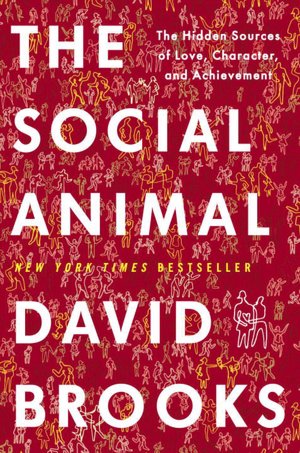
This book is a gem – if I was a doggie my tail would be wagging furiously. Newsflash: “the central evolutionary truth is that the unconscious matters most.” Research on the human mind over the past twenty years shows that emotion is more important than “reason, social connections over individual choice, character over IQ, emergent organic systems over linear, mechanistic ones, and the idea that we have multiple selves over the idea that we have a single self.”
But these findings really haven’t penetrated mainstream awareness. In order to present these discoveries in a readable, digestible way, Brooks (who some may recognize from the PBS News Hour and the New York Times) borrows a literary device from Jean-Jacque Rousseau’s book “Emile.” He creates two fictional characters, Harold and Erica, and uses their life stories to illustrate the principles discovered in the unfolding Cognitive Revolution. Their paths move from birth to education, friendship, love, careers and old age. Through various fictional incidents, Brooks shows how genes, brain chemistry, family structures and social patterns influence individual development.
I got my big warm fuzzy when Rationalism and his pimply, spoiled, pocket-protectored son Scientism got kicked to the curb in Chapter 14. Rationalism and Scientism are as guilty as organized religion of countless abuses against nature, animals, humans, and society, so it was awesome to see their mechanistic, reductionistic asses get blown out of the airlock.
Rationalism and Scientism account for several generations of failed social and economic experiments based on overly simplistic, linear analyses and woo-woo scientific diagrams that measure people and their responses as if we were stupid go-bots with easily predictable behaviors and the emotional range of a teaspoon. Brooks gives a detailed list of failed experiments and government policies based on so-called rational thought, and it’s a joy to see a century of policy wonks twist in the wind.
The cognitive research presented here extends to spirituality and politics, and in this respect, the book is like a box of Cracker Jacks chock full of groovy prizes. Readers get an eye-opening new view of Adam Smith, keen insights on the real differences between Democrats and Republicans, and the government’s role in the disintegration of the social fabric. A crispy-crunchy example of one of the many treats is in Chapter 20, where “a study by Katherine Faust and John Skvoretz found that friendship networks within the U. S. Senate were remarkably similar in structure to the social licking networks among cows.” (313-314) In fact, where policy makers fail most miserably is in understanding the role of social trust and the critical importance of building functional support networks – something the American neo-pagan shadow population has been doing fairly successfully for nearly five decades.
As an astrologer and tarotist, I’ve always been certain that the unconscious mind was the hidden kingdom and not just an over-decorated closet for forgotten and repressed memories. As the book confirms, it’s not the ability to speak or logical thought that makes us human – it’s our ability to create complex neural models for evaluation, decision making and (wait for it…..) prediction! Our unconscious minds are prediction laboratories and – surprise, surprise – yes, we can be trained to be good at making predictions! So this book is a happy validation for all of those folks who are skeptical of the sovereign role of scientific method and the over-glorification of logic over emotions.
While I have an admittedly low tolerance level for airy-fairy self-help books with the mental nutritional value of processed, individually-wrapped slices of American cheese, any book that help us understand ourselves as individuals and as a tapestry of humanity flowing through the river of historic time, as this one does, gets my unreserved approval and enthusiastic recommendation. Two thumbs up and a wagging tail for this book! It’s deep, it’s long, but well worth the effort.
~review by Elizabeth Hazel
Author: David Brooks
Random House 2011
pp. 424, $27.00
